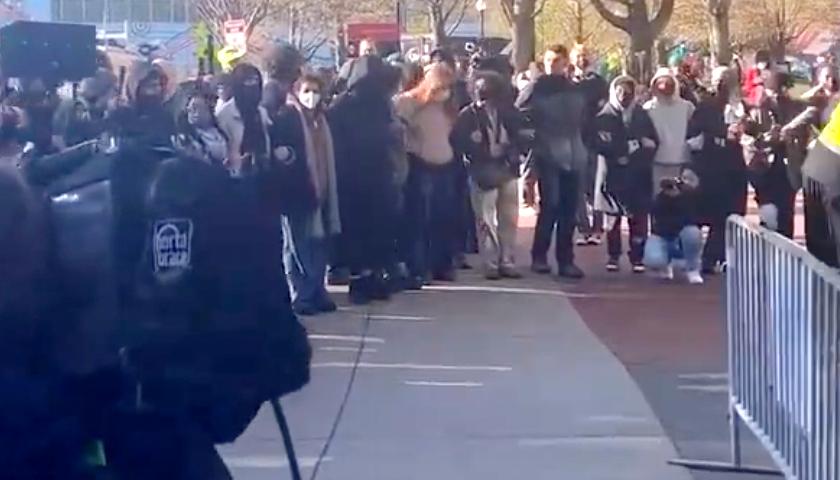State Representative Jessica Benham (D-PA-Carrick) is asking colleagues to cosponsor her new bill to pay rail-safety inspectors at the Pennsylvania Public Utility Commission (PUC) more and hire more of them.
Benham’s is the latest in a profusion of measures offered by Keystone State lawmakers to address freight-rail concerns in light of the train derailment in East Palestine, Ohio that occurred two months ago. A memorandum she authored describing her bill suggests the commonwealth needs more than its current 10 rail-safety inspectors who oversee more than 5,600 miles of track.
The representative cited testimony that PUC Chair Gladys Brown Dutrieuille provided to the state Senate Transportation Committee in 2015 asserting that the commission has had difficulty recruiting and retaining qualified workers for these roles. Dutrieuille told the panel that both the Federal Railroad Administration (FRA) and transit companies pay inspectors more than the PUC does, so workers often leave the latter entity for a job in one of the former. Because these state employees obtain federal certification before assuming their duties, they can easily make the transition to the FRA or the private sector.
A search of the commonwealth’s employee-salary database turned up pay figures for five rail-safety inspectors earning salaries that range from $49,526 to $60,558. In a letter this February to Governor Josh Shapiro (D) restating the recruitment concerns she raised eight years ago, Dutrieuille said these employees receive the third-lowest compensation among similar state workers across the U.S. Benham’s legislation would make $120,000 the minimum annual salary for Pennsylvania rail-safety inspectors and lift that base yearly according to inflation.
“Rail safety inspectors in our state are overburdened and underpaid,” Benham wrote in her memo. “These individuals play a crucial role in keeping our communities safe from potential derailments and other accidents. The lives of our state’s residents are in their hands, and they deserve more support from us.”
The lawmaker told The Pennsylvania Daily Star her bill will not set a minimum number of inspectors but direct the PUC to “expand the complement of railroad safety inspectors to a level that ensures compliance with inspection requirements.”
Other legislation Benham’s colleagues have proposed in recent weeks to address rail safety include a measure by Representative Louis Schmitt, Jr. (R-Altoona) to disallow a freight train’s length to exceed 8,500 feet. Another bill sponsored by Representatives Jim Marshall (R-Beaver Falls) and Rob Matzie (D-Ambridge) would enhance maintenance and oversight standards for wayside hotbox detectors, set a minimum number of personnel staffing each train and facilitate reporting of problems.
The eastern-Ohio wreck to which these lawmakers are largely responding involved a train with several cars containing vinyl chloride and other hazardous materials (hazmats). After the derailment, Norfolk Southern Corp. officials proceeded to vent and burn five hazmat-filled cars. Shapiro indicated days after the accident that he supported the incineration but later reversed himself, insisting that the company initially voiced a plan to burn one car rather than five.
In the incident’s aftermath, many residents have reported discoloration of local waterways, pervasive odors and dead livestock as well as various human health consequences including rashes, migraines, nausea and diarrhea.
Norfolk Southern has itself followed the derailment with an agreement to disburse roughly $7.4 million in Pennsylvania, most of which will reimburse public agencies for their response efforts and about $1 million of which will aid affected residents. The corporation has also announced it will implement a safety-enhancement plan entailing more advanced and more numerous bearing detectors to sense overheating, deployment of axle-vibration sensors and more artificial-intelligence devices to locate defects.
According to the FRA, train derailments totaled 1,044 last year, a 4.2-percent increase over the prior year. Such incidents have however fallen in recent decades. In 1978, the number of loaded freight cars that derailed was 36,786; that total fell to 3,037 in 2022.
Where hazmat-carrying trains are concerned, accident figures have also improved. In 1978, 205 derailed cars discharged toxic chemicals, whereas only 15 did last year. This is despite the fact that the weight of American freight times the total distance that material was transported increased from 932 billion ton-miles in 1980 to 1,440 billion in 2020.
Benham said she believes her staffing and pay proposal could get the bipartisan traction it would need to pass both the Democrat-run state House and the GOP-controlled state Senate to reach Shapiro’s desk.
“I am looking forward to continuing to work closely with legislators on both sides of the aisle to move this legislation forward,” she said. “Rail safety is not a partisan issue; it’s a public safety issue.”
– – –
Bradley Vasoli is managing editor of The Pennsylvania Daily Star. Follow Brad on Twitter at @BVasoli. Email tips to [email protected].
Photo “Jessica Benham” by Jessica Benham. Background Photo “Norfolk Southern Locomotives” by Jud McCranie. CC BY-SA 4.0.




